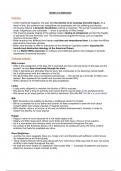Summary
A* Summary - 'Death of a Salesman'
A* SUMMARY FOR 'DEATH OF A SALESMAN' AQA ENGLISH LITERATURE B ASPECTS OF TRAGEDY - This includes everything you will need to know about 'Death of a Salesman' in order to get an A* in you English Literature A-Level. This document includes an overview of the play, a plot summary, key quotations a...
[Show more]




